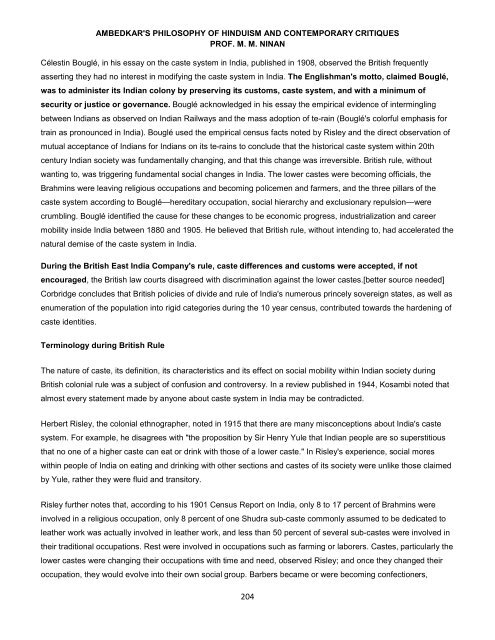Ambedkar-Philosophy of Hinduism
You also want an ePaper? Increase the reach of your titles
YUMPU automatically turns print PDFs into web optimized ePapers that Google loves.
AMBEDKAR'S PHILOSOPHY OF HINDUISM AND CONTEMPORARY CRITIQUES<br />
PROF. M. M. NINAN<br />
Célestin Bouglé, in his essay on the caste system in India, published in 1908, observed the British frequently<br />
asserting they had no interest in modifying the caste system in India. The Englishman's motto, claimed Bouglé,<br />
was to administer its Indian colony by preserving its customs, caste system, and with a minimum <strong>of</strong><br />
security or justice or governance. Bouglé acknowledged in his essay the empirical evidence <strong>of</strong> intermingling<br />
between Indians as observed on Indian Railways and the mass adoption <strong>of</strong> te-rain (Bouglé's colorful emphasis for<br />
train as pronounced in India). Bouglé used the empirical census facts noted by Risley and the direct observation <strong>of</strong><br />
mutual acceptance <strong>of</strong> Indians for Indians on its te-rains to conclude that the historical caste system within 20th<br />
century Indian society was fundamentally changing, and that this change was irreversible. British rule, without<br />
wanting to, was triggering fundamental social changes in India. The lower castes were becoming <strong>of</strong>ficials, the<br />
Brahmins were leaving religious occupations and becoming policemen and farmers, and the three pillars <strong>of</strong> the<br />
caste system according to Bouglé—hereditary occupation, social hierarchy and exclusionary repulsion—were<br />
crumbling. Bouglé identified the cause for these changes to be economic progress, industrialization and career<br />
mobility inside India between 1880 and 1905. He believed that British rule, without intending to, had accelerated the<br />
natural demise <strong>of</strong> the caste system in India.<br />
During the British East India Company's rule, caste differences and customs were accepted, if not<br />
encouraged, the British law courts disagreed with discrimination against the lower castes.[better source needed]<br />
Corbridge concludes that British policies <strong>of</strong> divide and rule <strong>of</strong> India's numerous princely sovereign states, as well as<br />
enumeration <strong>of</strong> the population into rigid categories during the 10 year census, contributed towards the hardening <strong>of</strong><br />
caste identities.<br />
Terminology during British Rule<br />
The nature <strong>of</strong> caste, its definition, its characteristics and its effect on social mobility within Indian society during<br />
British colonial rule was a subject <strong>of</strong> confusion and controversy. In a review published in 1944, Kosambi noted that<br />
almost every statement made by anyone about caste system in India may be contradicted.<br />
Herbert Risley, the colonial ethnographer, noted in 1915 that there are many misconceptions about India's caste<br />
system. For example, he disagrees with "the proposition by Sir Henry Yule that Indian people are so superstitious<br />
that no one <strong>of</strong> a higher caste can eat or drink with those <strong>of</strong> a lower caste." In Risley's experience, social mores<br />
within people <strong>of</strong> India on eating and drinking with other sections and castes <strong>of</strong> its society were unlike those claimed<br />
by Yule, rather they were fluid and transitory.<br />
Risley further notes that, according to his 1901 Census Report on India, only 8 to 17 percent <strong>of</strong> Brahmins were<br />
involved in a religious occupation, only 8 percent <strong>of</strong> one Shudra sub-caste commonly assumed to be dedicated to<br />
leather work was actually involved in leather work, and less than 50 percent <strong>of</strong> several sub-castes were involved in<br />
their traditional occupations. Rest were involved in occupations such as farming or laborers. Castes, particularly the<br />
lower castes were changing their occupations with time and need, observed Risley; and once they changed their<br />
occupation, they would evolve into their own social group. Barbers became or were becoming confectioners,<br />
204


















